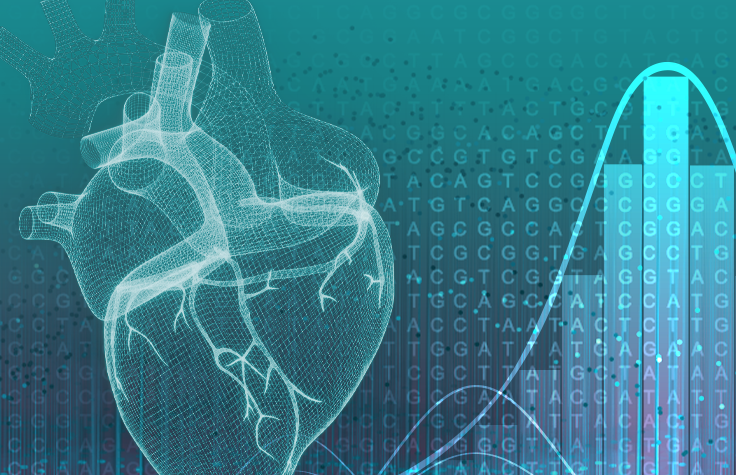Cardiovascular Genomics
Understanding cardiovascular diseases through genomic sequencing
The need for comprehensive coverage of cardiac genes and variants

Importance of identifying gene variants for cardiovascular disease
Cardiovascular genomics research has identified many genetic variants associated with cardiovascular related conditions. Studies have shown that most causative gene variants are unique familial variants,1 and therefore, seen infrequently.2 Additionally, small panels used in clinical testing can miss causal gene variants implicated in inherited heart diseases.
Comprehensive next-generation sequencing (NGS) panels for cardiovascular genomics provide broad coverage of cardiac genes with links to known diseases. Unlike single-gene assays or small panels, which can lead to time-consuming and expensive iterative testing, NGS panels assess multiple cardiac genes simultaneously.
The growing case for using genomics to understand cardiovascular disease
Although many causes of cardiovascular disease can be linked to lifestyle and behavior, there still remains much more to learn about how genetic variation can contribute to disease. To help put things into perspective, here are a few general facts about heart disease.
Cardiovascular disease is the leading cause of death globally, claiming around 17.9 million lives each year.3
The number of people living with cardiovascular disease nearly doubled from 1990 to 2019, from 271 million to 523 million cases.4
The heritability of coronary artery disease has been estimated between 40% and 60%.5
Selected cardiovascular diseases with known genetic links
The American Heart Association (AHA) summarizes the current best practices for genetic testing in inherited cardiovascular conditions, including arrhythmias, cardiomyopathies, vascular disorders, and lipid disorders (such as familial hypercholesterolemia). Even patients who have been clinically diagnosed with an inherited cardiovascular disease could benefit from genetic testing, as it could identify the responsible variant and help to better guide their management, treatment, and inform cascade testing.6
Over 1 in 2,000
Arrhythmias, a cardiovascular condition causing irregular or abnormal heartbeat rhythm, affect over 1 in 2,000 people.7
1 in 500
Cardiomyopathies affect 1 in 500 people. Also known as heart muscle disease, cardiomyopathy is the most common inherited cardiac disorder.8 This disease causes the heart to be unable to pump blood efficiently throughout the body.
16 in 100,000
Familial aortopathy, characterized by an abnormal change in the aorta, affects up to 16 in 100,000 people.9
1 in 300
Familial hypercholesterolemia, a genetic condition that causes high cholesterol, affects 1 in 300 people.10
Explore cardiovascular genomics topics

Cardiovascular disease research
Stay on the cutting edge of cardiovascular research with sequencing, microarrays, and multiomics. Learn about cardiac gene sequencing and other genomics solutions that can accelerate your discoveries.

Cardiovascular genetics for healthcare providers
Read about the benefits of cardiovascular genetics information for the diagnosis, management, and treatment of patients. Get updated guidelines from leading professional medical societies.

Is heart disease genetic?
Learn how genetic testing can help diagnosis, management, and treatment options.
THOUGHT LEADERSHIP
Featured cardiovascular genomics experts

The pharmacogenomics of cardiovascular disease therapies
Pharmacogenomics can reveal how individuals respond to drugs. In this interview, Dr. Marie-Pierre Dubé, PhD discusses clinical research that identified genotypes of cholesterol drug responders and nonresponders.

Can genetic testing improve cardiovascular outcomes?
In this webinar, Dr. Joshua Knowles discusses the importance of genetic cascade testing in familial hypercholesteremia, as well as the benefits of implementing polygenic risk scores.

Using genetics to predict heart attack risk
In this podcast, Dr. Guillaume Paré discusses how genetics can help identify people at risk for familial hypercholesterolemia and early cardiovascular disease.
Related content
Precision genomics
Genomics-powered precision medicine can help identify disease-associated variants, pinpoint the underlying genetic causes of diseases, and optimize management and treatments.
Polygenic risk scores
These scores represent the number of genetic variants an individual has that increase their risk of developing a particular disease. Explore key considerations and future uses.
References
- Ackerman MJ, Priori SG, Willems S, Berul C, Brugada R, et al. HRS/EHRA expert consensus statement on the state of genetic testing for the channelopathies and cardiomyopathies. Europace. 2001;13(8):1077-1109.
- Ashley EA, Hershberger RE, Caleshu C, Ellinor PT, Garcia JGN, et al. Genetics and cardiovascular disease: a policy statement from the American Heart Association. Circulation. 2012;126(1)142-157. Epub 2012 May 29.
- World Health Organization. 2023. Cardiovascular diseases.
- Roth GA, Mensah GA, Johnson CO, et al. Global Burden of Cardiovascular Diseases and Risk Factors, 1990-2019: Update From the GBD 2019 Study [published correction appears in J Am Coll Cardiol. 2021 Apr 20;77(15):1958-1959]. J Am Coll Cardiol. 2020;76(25):2982-3021. doi:10.1016/j.jacc.2020.11.010
- McPherson R, Tybjaerg-Hansen A. Genetics of Coronary Artery Disease. Circ Res. 2016;118(4):564-578. doi:10.1161/CIRCRESAHA.115.306566
- Musunuru K, Hershberger RE, Day SM, et al. Genetic Testing for Inherited Cardiovascular Diseases: A Scientific Statement From the American Heart Association. Circ Genom Precis Med. 2020;13(4):e000067. doi:10.1161/HCG.0000000000000067
- rarediseases.org/rare-diseases/romano-ward-syndrome/?filter=ovr-ds-resources
- cdc.gov/heartdisease/cardiomyopathy.htm
- Olsson C, Thelin S, Ståhle E, Ekbom A, Granath F. Thoracic aortic aneurysm and dissection: increasing prevalence and improved outcomes reported in a nationwide population-based study of more than 14,000 cases from 1987 to 2002. Circulation. 2006;114(24):2611-2618. doi:10.1161/CIRCULATIONAHA.106.630400
- Tada H, Takamura M, Kawashiri MA. Familial Hypercholesterolemia: A Narrative Review on Diagnosis and Management Strategies for Children and Adolescents. Vasc Health Risk Manag. 2021;17:59-67. Published 2021 Feb 17. doi:10.2147/VHRM.S266249